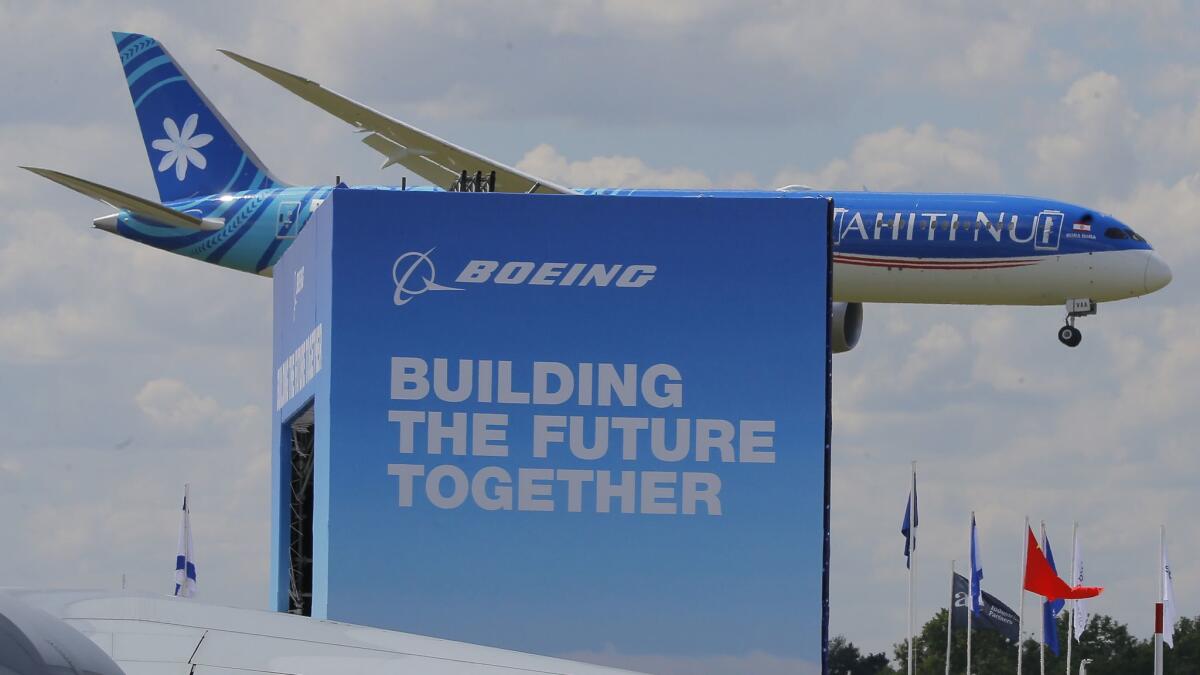Boeing apologizes for Max crashes as Airbus rakes in sales

Boeing executives apologized Monday to airlines and to families of victims of crashes of the company’s 737 Max jetliners in Indonesia and Ethiopia as the U.S. plane maker struggles to regain the trust of regulators, pilots and the global traveling public.
Some victims’ families welcomed Boeing’s gesture. Others called it too little, too late.
Boeing was visibly contrite at the opening of the Paris Air Show, where safety was on many minds as the global aviation elite gathered to showcase and trade cutting-edge, costly technology.
RELATED - Lawsuit: Black Boeing worker harassed, found noose at desk »
“We are very sorry for the loss of lives” in the Lion Air crash in October and Ethiopian Airlines crash in March, Kevin McAllister, chief executive of Boeing’s commercial aircraft division, told reporters.
A total of 346 people were killed in the disasters.
McAllister also said, “I’m sorry for the disruption” to airlines from the subsequent grounding of all Max planes worldwide and to their passengers facing summer travel disruptions.
Boeing executives defended improvements to Max software that has been implicated in the crashes but couldn’t predict when the plane could fly again.
Investigations are underway into what happened, though it’s known that angle-measuring sensors in both planes malfunctioned, alerting anti-stall software to push the noses of the planes down. Pilots were unable to take back control of the planes.
“Now they have apologized,” said Ningsi Ayorbaba, a mother of three whose husband, Paul Ferdinand Ayorbaba, was killed in the Lion Air crash. “I hope this is a good signal” for families like hers who have filed lawsuits against Boeing.
“No amount of money can bring my loved one back, but I want Boeing to be more transparent in the compensation process for the sake of the children” of victims left behind, she told the Associated Press.
Indonesia’s Transportation Ministry spokesman, Hengki Angkasawan, said his government needs “transparent work of the aircraft maker to fix the problem.”
Boeing has acknowledged botched communication with regulators over a cockpit warning system in the 737 Max and is promising more transparency about its promised fix.
Ethiopian Airlines Chief Executive Tewolde Gebremariam said only that Boeing’s apology “is consistent with our opinion.”
An Ethiopian who lost her younger brother in the Ethiopian Airlines crash said Boeing’s apology is not enough to return lost loved ones and expressed concern about Boeing’s push to return the 737 Max to the skies.
The Max is crucial to Boeing’s future. It is the newest version of Boeing’s bestselling plane and was a direct response to Airbus’ fuel-efficient A320neo. Airlines like fuel efficiency because it saves money and helps them respond to growing public and regulatory pressure to reduce emissions. But Airbus has outpaced Boeing in selling planes in this category.
With many of its airline customers and suppliers at the air show, Boeing repeatedly insisted it is focusing on getting the Max recertified and speeding up production of the planes.
In addition to safety concerns, the global economic slowdown and trade tensions are weighing on the mood at the air show.
Boeing announced only lackluster orders at the start of the show, while rival Airbus announced a bevy of new sales and launched a new long-range single-aisle jet, beating Boeing to a market that both aviation giants predict will grow.
In the biggest new plane announcement expected at the air show, Airbus formally launched its long-range A321XLR. The plane should be ready for customers in 2023 and be able to fly as far as 4,700 nautical miles.
Chief salesman Christian Scherer wouldn’t say how much the plane would cost to develop.
Right after the launch, Air Lease Corp. of Los Angeles signed a letter of intent to buy 27 of the new Airbus planes.
That’s a new challenge for Boeing, which said Monday it is still working on plans for a possible jet in the same category — dubbed New Midsize Airplane, or NMA. It would fill a gap in the Boeing lineup between the smaller 737 and the larger 777 and 787.
The air show also hosted the kickoff of a joint European fighter jet and is seeing a growing focus on electric planes and other planet-friendly technology.
RELATED: Boeing wanted to wait three years to fix safety alert on 737 Max »
Separately, a black man who has worked for a decade at a Boeing plant in South Carolina says he has been routinely subjected to racist harassment.
Curtis Anthony is suing the company, saying his complaints about racist treatment were met with retaliation.
Anthony said his white co-workers at the Charleston plant repeatedly urinated on his desk and seat. He said he found a noose hanging above his desk this year. Boeing has said it fired the worker who hung the noose. But Anthony says he was transferred to a work unit that lacked air conditioning after complaining about the harassment.
Boeing said most of Anthony’s allegations were not brought to managers’ attention, “giving the company no opportunity to investigate these claims.”
More to Read
Inside the business of entertainment
The Wide Shot brings you news, analysis and insights on everything from streaming wars to production — and what it all means for the future.
You may occasionally receive promotional content from the Los Angeles Times.










